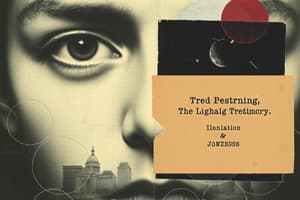Podcast
Questions and Answers
What is reconstructive memory?
What is reconstructive memory?
Memory does not work like a video recording; it suggests that we fill in gaps based on our experiences and knowledge.
What was the aim of Loftus and Palmer's (1974) study?
What was the aim of Loftus and Palmer's (1974) study?
To investigate how leading verbs can change eyewitness testimony with recall of objects.
What were the two groups in Loftus and Palmer's study based on the leading verb used?
What were the two groups in Loftus and Palmer's study based on the leading verb used?
- Hit group
- Smashed group
- Both A and B (correct)
- None of the above
What did Brewer and Treyens (1981) aim to investigate?
What did Brewer and Treyens (1981) aim to investigate?
Participants in Brewer and Treyens (1981) were able to recall objects not present in the office but that fit the office schema.
Participants in Brewer and Treyens (1981) were able to recall objects not present in the office but that fit the office schema.
What did Anderson and Pichert (1978) explore?
What did Anderson and Pichert (1978) explore?
What were the results of Anderson and Pichert's (1978) study regarding recall?
What were the results of Anderson and Pichert's (1978) study regarding recall?
Flashcards are hidden until you start studying
Study Notes
Reconstructive Memory
- Memory functions differently than a video recording; it is often incomplete and relies on recalling important points.
- Reconstructive memory means we fill in information gaps based on prior knowledge and experience.
- Bartlett's theory states that schemas help us complete memories using our expectations, beliefs, and experiences.
Loftus and Palmer (1974)
- Aim: Examine how leading verbs affect eyewitness testimony.
- Method: Participants viewed a one-minute film of a car accident; the independent variable was whether the verb "hit" or "smashed" was used.
- Dependent Variable: Recall of false objects, operationalized by asking about broken glass a week later.
- Results: 32% of participants exposed to "smashed" reported seeing broken glass, compared to 14% for "hit."
- Conclusion: The wording of questions can alter memories, leading to the recall of items that did not occur.
Brewer and Treyens (1981)
- Aim: Investigate schemas' role in episodic memory encoding and retrieval.
- Method: 30 psychology students waited in an office designed with common and uncommon objects. They later recalled items from memory.
- Results: Objects linked to the office schema were recalled more often, while inconsistently represented items were remembered less frequently. Some recalled items that weren’t present but fit the schema.
- Conclusion: Schema influences recall; gaps in memory were filled using participants’ schemas, supporting reconstructive memory.
Anderson and Pichert (1978)
- Aim: Explore how schema processing shapes both encoding and retrieval.
- Method: Participants heard a 72-point story from either a house-buyer’s or burglar’s perspective. They then switched roles after a break in testing.
- Results: The group changing schemas recalled 7% more points on the second test; recall of points linked to the new schema increased by 10%, while relevant aspects of the prior schema decreased.
- Conclusion: Schema processing affects memory retrieval and encoding, as new schemas can shift recall preferences, indicating flexibility in memory retrieval.
Studying That Suits You
Use AI to generate personalized quizzes and flashcards to suit your learning preferences.




